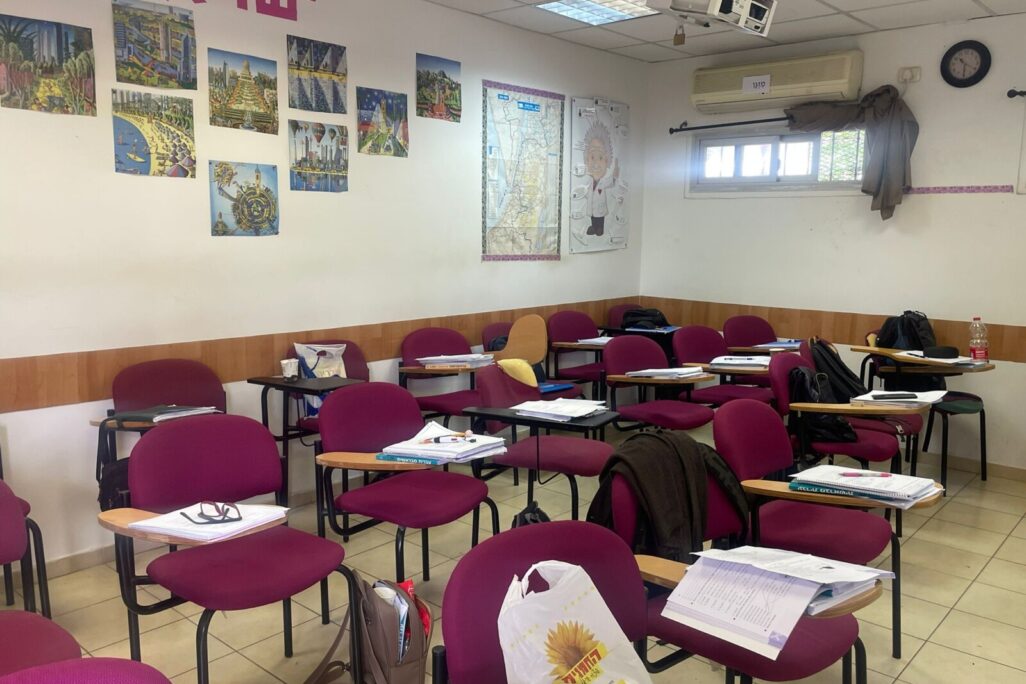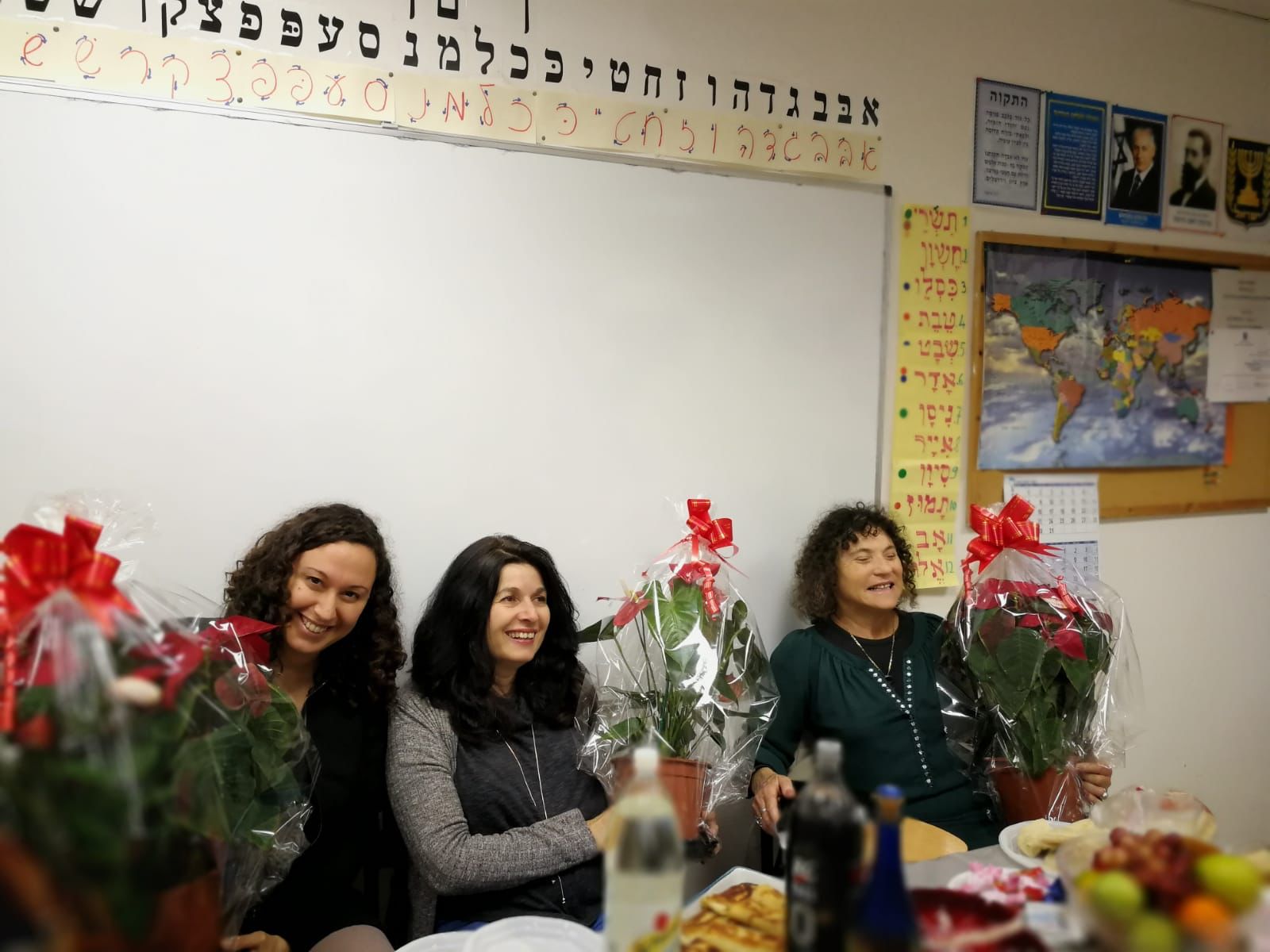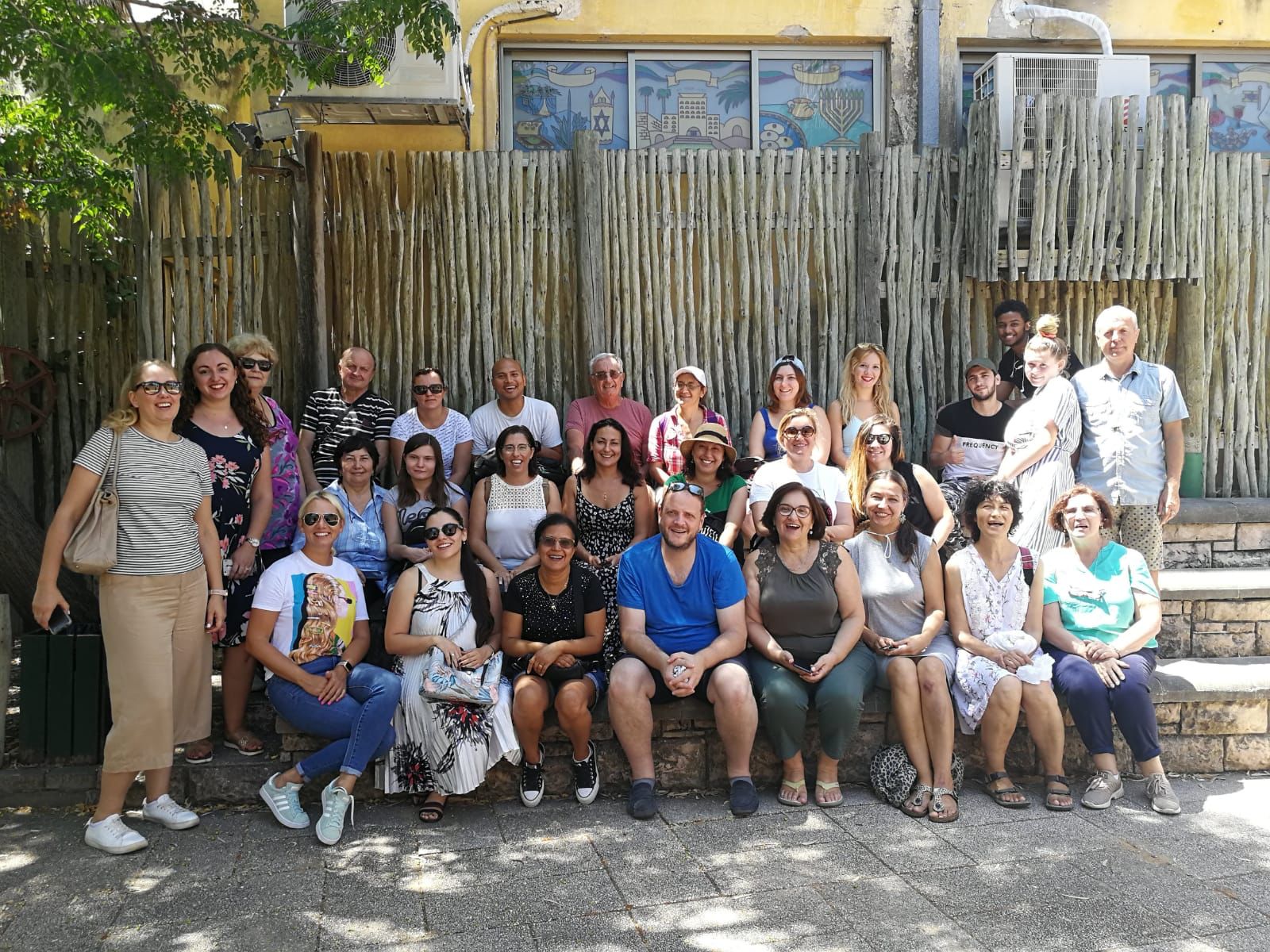
Hundreds of ulpan teachers took off of work earlier this week, using their two allotted personal days in unison to shut down classes throughout the country. Teachers at ulpanim, intensive Hebrew language classes offered by the government to new immigrants at a highly subsidized rate, are demanding improvements to their wages and conditions in line with the new salary agreement reached between the Finance Ministry and the Teachers’ Federation last October, in which ulpan teachers were not included.
Over 74,000 olim chadashim, or new immigrants, have arrived in Israel in the last year, putting a strain on the public ulpan system and leading to large class sizes and monthslong waiting periods for admittance to ulpan classes. In addition to the agreement with the Teachers’ Federation, ulpan teachers were also not included in the "framework agreement" that was agreed to by the Finance Ministry and the Histadrut earlier this month to raise wages for public sector employees. As a result, ulpan teachers’ salaries have not been updated in the last 15 years, despite the rapidly increasing cost of living.
Ketty Segev, an ulpan teacher, pedagogical guide and information and computer technology coordinator in the ulpan system has been teaching Hebrew for 15 years, 10 of those in the Ministry of Education (public sector ulpan). She has a bachelor’s degree in psychology and Hebrew language as well as a master’s degree in cognition. According to Segev, "the salary of the ulpan teachers has not improved for the last 15 years, the cost of living has risen greatly in Israel, the workload in the ulpanim is tremendous, and the teachers are already starting to collapse under all the stress and pressure. It is not possible to continue working at this low salary and in these difficult conditions. A teacher like me, with a higher education and 15 years of experience teaching Hebrew in the ulpan, earns about 7,000 shekels [$1,970] a month. It is unimaginable."
Efrat Iluz, 27, has worked as an ulpan teacher for six years, and currently teaches at Ulpan Hadera. She explained that "no new teachers want to come and teach because of the hard situation with the ulpanim. New teachers prefer to work in schools because the salary is 30-40% higher."

Alongside low salaries, the increase in arrivals of new olim has worsened classroom conditions. "Many immigrants came to Israel in the last year," Segev said, "but due to low wages there is no one to teach the new olim. This results in the formation of very busy classes, and many students who simply miss out. You can’t go on like this."
Iluz noted that the shortage of ulpan teachers can affect new olim financially. "If there are not enough teachers for all the new olim," she said, "it means they can’t learn at ulpan, and they can’t find work. Language is a condition." New olim receive financial assistance for the first six months after their arrival, making this initial period of absorption the best time for many immigrants to complete the five month ulpan course. Due to long wait times, many students currently enrolled in ulpan classes have finished receiving their initial financial support from the state and are now required to conduct their language studies while maintaining jobs.
Iluz and Segev both expressed hope that the protest will result in a meaningful salary increase for public sector ulpan teachers, and that this will in turn attract new ulpan teachers and improve the conditions for the students. "The teachers in the adult education department are high-quality teachers, mostly with a master's degree, who undergo many training courses and are forced to meet the strict requirements of the Ministry of Education, but they are not adequately compensated," said Segev. "The teachers work very hard around the clock, in the mornings or in the evenings, and prepare quality lessons for the mature students. Our students are learned people, who demand quality lessons, they are required to juggle between family, new residence in Israel and studies in the ulpan, and the teacher must succeed in bringing them, despite the difficulties, to optimal performance in the Hebrew language, and to succeed in an official test on behalf of the state."
Segev further noted that "a teacher in the ulpan is the most significant person for the new oleh because they meet each other every day and the teacher provides them with a listening ear, help in finding a job, support in dealing with the bureaucracy, and despite all the additional roles that teachers have in the ulpan, they receive a much lower salary than their counterparts in the Ministry of Education who deal with educating children. This is not possible and must change."
According to Iluz, the first step in improving the situation of the ulpanim is for government ministers to see firsthand how an ulpan operates. "I want the ministers to come to the ulpanim so they can know what an ulpan actually is. They always talk in the Knesset but they don’t really understand what it is. Like for example, before I was a teacher I didn’t know what an ulpan was, I didn’t know about the sector. Olim and the ulpan system exist in the shadows. We didn’t speak about it, we didn't even know about it."
Is Ulpan Relevant in a Modern World?
"In the modern world we live in, there are many options for experimenting with new languages through apps or online courses," Segev said. "But these ways can only add to and cannot replace the ulpan experience. In the ulpan the students hear only Hebrew, they get to know other students who are in their situation and feel they belong, they get to know an Israeli teacher who mediates the language and culture for them, and most importantly, in the ulpan the students experience the language themselves as much as possible. The ulpan is a practice space where you learn, experiment and are allowed to make mistakes and thus learn and develop.
"[Ulpan classes] are the first home of the olim chadashim," said Iluz, "it’s their first klita [absorption]. If they have questions or problems they can ask their questions to the teachers and their classmates. They arrive and Israel is a big country, they think 'Where am I?' and 'What do I need to do?' and at ulpan they can collect all their answers, put it in a small bag and take it with them. Without language, there is no involvement in society. Language is the bridge between people."
Segev added that she “met students [she] taught more than 10 years ago and they never forgot this experience. In the initial period in Israel, the new olim may feel loneliness, fear, frustration and above all, a lack of belonging, and their friends in the ulpan as well as the teacher have tremendous power in reducing these feelings and in creating a safe and accepting space, a kind of bubble that the student can come out of with the strength to continue living here."
Natali Crimer, 38, is a new olah from Argentina and is currently studying at Ulpan Hadera. She arrived in Israel in October 2022 and began studying in December 2022. She said that having access to learning Hebrew in the ulpan "is really important to have a life here in Israel. To meet people, to be able to work, to have a social life too." Before making aliyah [immigration to Israel], Crimer tried to study in an online ulpan, but she described it as incredibly difficult and not the same as studying in person every day.
Yan Freiman, 41, came to Israel in November 2022 from Ukraine. "We thought about coming to Israel before," Freiman said, "but the war was a good factor in helping us make the decision to come." Freiman, who also studies at Ulpan Hadera, said that learning Hebrew is important to him. "I want to understand and to feel like this is my home, and without knowing the language you will never get this feeling," he said. "It is a good feeling when I understand people on the streets, or when my family speaks Hebrew to me. I feel connected to the country more through language, and it leads me to the feeling of safety and home."

"Ulpan is Our First Step into Society, and the Teachers are Our First Providers of a New Life"
Crimer and Freiman both praised their teachers and the commitment and support they have felt from them throughout the course. "The teachers are amazing, and we are very lucky to have them," said Crimer.
“The teachers are great," Freiman agreed. "They really give themselves to this work, as I know they aren’t paid that much for it, but here, teachers who are doing it really love their job. Education is important in any society, but here in ulpan it's our first step into society and the teachers are our first providers of a new life. It's very hard to adapt, but they make it as simple as they can. They don't only teach language, I feel like they give us more."
Segev agreed that the connection between ulpan students and teachers can go beyond the classroom. "Teaching in the ulpan is so significant and it is felt every day and every moment. When I arrive at the ulpan I smile big, and when I leave it, I smile even more. The most significant moments for me happen when I meet former students in my daily life, in line at the pharmacy or in the supermarket, and I suddenly see them and hear them successfully functioning in Hebrew. Later when we talk, I am proud to hear that today they are working at a job they love and that their children are happy here. It is a great satisfaction."
Iluz shared that "[in] every course there are many students that at the end tell me ‘Wow, I had a situation at the bank where they didn’t speak Russian or French and I pushed myself to speak Hebrew and I was successful.'"
"The most important thing people need to know," according to Segev, "is that this is a problem for all of us and not just the ulpan teachers, because as soon as no one wants to work in the ulpanim and teach Hebrew, and the olim cannot learn Hebrew, they are simply forced to leave and not stay here. The state has invested huge sums of money in bringing immigrants to Israel, these sums have already been invested, and the olim are here and want to stay, live here and work with dignity. All kinds of people come here, including doctors, and engineers who could work here and contribute a lot to society and to improving the economic situation in Israel, but the Hebrew language is their ticket to society and work here, and if there is no one to teach them, they have nothing to do here. This is a huge loss for all of us, and to prevent it there is a simple solution – to raise the salary of the ulpan teachers."
This article was written by Nancye Kochen, a new olah from Australia who is currently studying at Ulpan Hadera.






